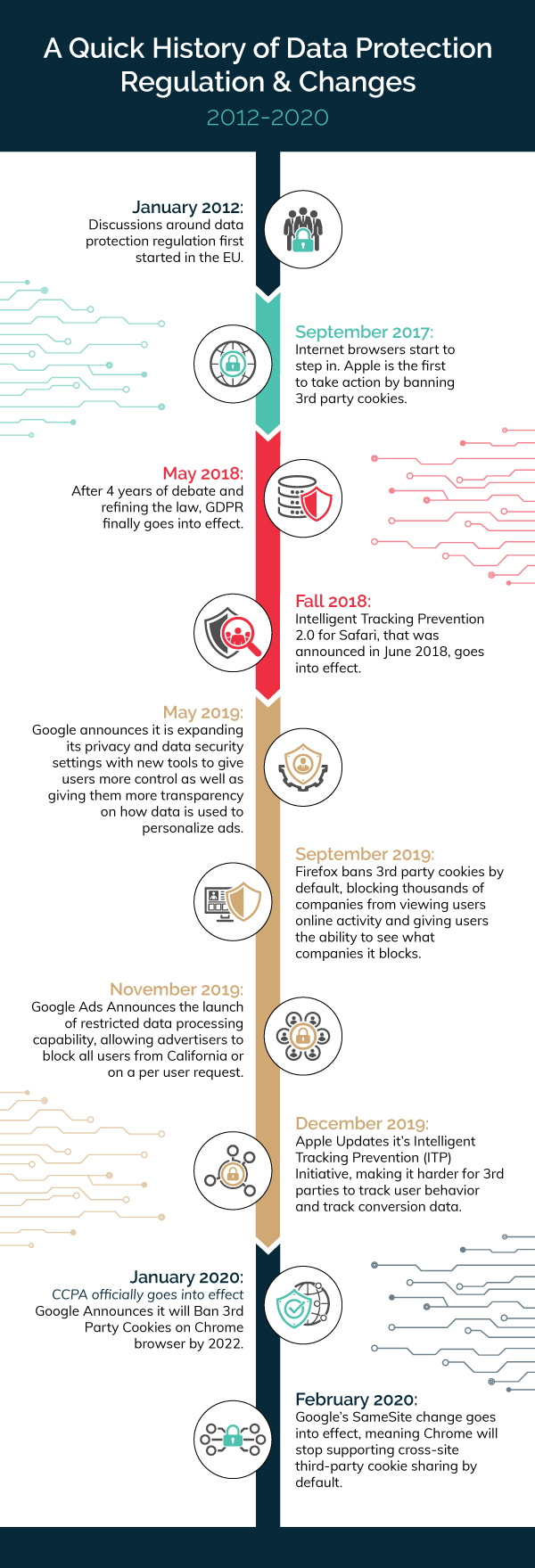The Rise of Data Regulation & The Impact on Hotel Marketing
The rise of digital advertising grew from an era of limited tracking capabilities to an era of almost unlimited access to tracking user data across the web. This advancement in tracking has provided amazing opportunities to enhance campaign targeting options, narrowing targets based on user behavior and tying that tracking back to direct online booked revenue. This wild west atmosphere of digital tracking reached an apex that finally had governments and citizens around the world taking notice and growing concerned. Concepts around privacy and data took hold with the general public and political scandals, such as the ones documented in Netflix's The Great Hack. This drew attention to the need for the government to step in and help protect citizens from how their data was tracked, used and sold across the web.
To better understand where we are and what it means for hotel marketing, let’s look back at a brief timeline of changes and regulations surrounding online data over the past decade.

September 2017: Internet browsers start to step in. Apple, whose revenues don’t rely on advertisements, was the first to take action by banning 3rd party cookies in September 2017.
May 2018: After 4 years of debate and refining the law, GDPR finally goes into effect. The first set of regulations aimed at protecting citizens from how their data is tracked, used, stored and sold.
Fall 2018: Intelligent Tracking Prevention 2.0 for Safari, which was announced in June 2018, goes into effect.
May 2019: Google announces during Google Marketing Live that it is expanding its privacy and data security settings with new tools to give users more control as well as giving them more transparency on how data is used to personalize ads.
September 2019: Firefox bans 3rd party cookies by default, blocking thousands of companies from viewing users' online activity and giving users the ability to see what companies it blocks.
November 2019: Google Ads Announces Data Processing Restriction Setting. The launch of restricted data processing capability allows advertisers to block all users from California or on a per-user request. Applying this setting turns off the ability to build and use remarketing lists for these users.
December 2019: Apple’s Update to It’s Intelligent Tracking Prevention (ITP) Initiative made it harder for 3rd parties to track user behavior and track conversion data.
January 2020: CCPA officially goes into effect. Google Announces it will Ban 3rd Party Cookies on Chrome browser by 2022.
February 2020: Google’s SameSite change goes into effect, meaning Chrome will stop supporting cross-site third-party cookie sharing by default.
In addition to CCPA, there are new laws and regulations on state legislature dockets across the country. How or when the U.S. federal government will take action in the form of data regulation law is unknown. The question remains, how will your hotel marketing evolve and change based on current and future changes coming to data regulation. We’ve taken some time to outline how we are viewing data regulation changes and evolving our hotel marketing to address them.
What Do These Changes in Data Regulation and Tracking Mean for Hotel Marketing?
- You should have already consulted your lawyer. The topics and laws surrounding data regulation and technology changes can easily get confusing. GCommerce recommends that you consult with your hotel’s consumer privacy lawyer immediately if you haven’t done so already to make sure your business is in compliance with these laws. Please feel free to check out our GDPR and CCPA guides for hotels, but understand that these are not to be used in any way as legal advice.
- Audience lists, such as remarketing lists, will be impacted. As more people take control of their privacy and restrict sites from using cookies to track their actions and behavior, the data behind audience lists will decline and so will remarketing audience list sizes. While we’re not seeing a huge impact on our clients yet, this might result in the decline in size for these types of audience lists which can directly impact ROAS tracked.
- Lean into 1st party data for audience and campaign targeting. While companies that rely on 3rd party cookies to track user behavior across the web and develop audiences will suffer, companies that hold 1st party data such as Google and Facebook stand to gain the most benefit. Since Google has so much 1st party user data through its various platforms, it can continue to offer rich in-market and affinity audience targeting opportunities through its ad platforms. GCommerce already uses these audiences to drive targeting campaigns and will continue to use audiences that provide favorable results for our clients.
- Our ability to track conversions will suffer. It will continue to get harder to track conversions to the same level of detail we have been used to through some browsers and platforms. The changes implemented by Firefox, Safari, and Chrome can all have an impact on this tracking. The industry is having to pivot and changes in technology that move away from cookie tracking are being worked on by large tech companies including Google. GCommerce is on the pulse of changes to pivot how we implement tracking across sites like Google Analytics to mitigate as much interruption to tracking as possible.
- Contextual targeting will become a greater asset. Contextual targeting options on Google and DV360 offer an alternative to audience-based targeting. Using keywords and topics allows us to craft ads and messaging to match content the user is viewing. This will continue to be a method for us to effectively market our clients and drive performance.
- Automation and machine learning tools can help. When cookies are blocked, it also prevents the ability to control certain campaign aspects like ad frequency. Google is investing heavily in ways to ensure the user experience isn’t impacted. One way is using machine learning within DV360, GCommerce’s programmatic solution of choice, to help prevent users from seeing your ad too many times.
The digital environment will continue to evolve as more data protection regulation emerges, forcing platforms and advertisers to adjust accordingly. While this does provide uncertainty in areas like audiences and tracking, it does provide the hope of a more secure web for us all. Please reach out to GCommerce with any questions you have in regards to our stance and preparation for these changes to the hotel digital marketing landscape.



